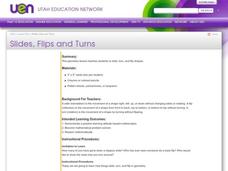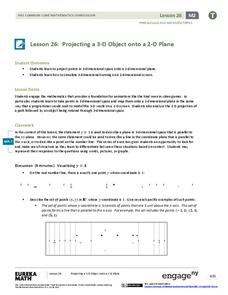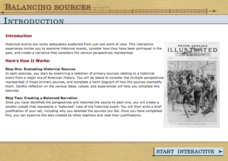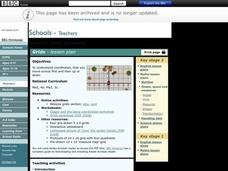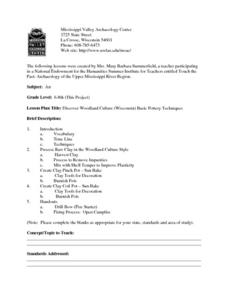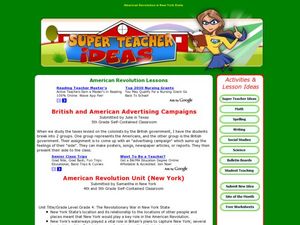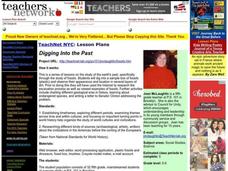TryEngineering
Graphics: Bits and Points
What can a mural teach pupils about computer science? The lesson has scholars create a mural on a wall to learn about bitmap and vector graphics. Along the way, they learn about the graphics coordinate system.
CK-12 Foundation
Points that Partition Line Segments: Cutting a Log
Teach ratios of line segments using an interactive approach. Scholars examine a line segment in the shape of a log and use their knowledge of ratios to divide it into various partitions. As an introductory lesson, the segment has a...
Curated OER
Slides, Flips and Turns
Third graders are introduced to the meanings of the concepts slides, turns, and flips in how they relate to Geometry. As a class, they use their bodies to demonstrate how each term should look like. To end the lesson, they apply the...
EngageNY
Projecting a 3-D Object onto a 2-D Plane
Teach how graphic designers can use mathematics to represent three-dimensional movement on a two-dimensional television surface. Pupils use matrices, vectors, and transformations to model rotational movement. Their exploration involves...
EngageNY
Secant and the Co-Functions
Turn your class upside down as they explore the reciprocal functions. Scholars use the unit circle to develop the definition of the secant and cosecant functions. They analyze the domain, range, and end behavior of each function.
Annenberg Foundation
Balancing Sources
Pupils turn into investigative reporters throughout history to learn what it takes to balance different primary sources on the same topic. They use what they learn to create a narrative based on their own interpretation of a historic...
Curated OER
Keeping Your Heart in Good Shape: What are the Benefits? - Biology Teaching Thesis
Students name the main parts of the heart and what events occur there. They write a reaction that contains complete sentences, and uses proper spelling and grammar, after viewing a video. Students define the following terms: contraction,...
Heidi Songs
Zoo Animal Probability Graph
Capture the engagement of your young mathematicians with a collaborative graphing activity. Using a deck of zoo animal picture cards, students select a picture from the deck, record the chosen animal on a graph,...
Curated OER
Slides, Flips and Turns
Third graders slide, turn, and flip their bodies to explain sliding, turning, and flipping geometric shapes.
Curated OER
Naming Shapes
Students study geometric shapes and practice naming them properly. In this geometry lesson, students work in groups to give definitions of the vocabulary to each other in their own words. Students also visit a lower grade and teach...
Discovery Education
Architects in Action
Hands-on and real-world applications are great ways to teach mathematical concepts. Creative thinkers examine how ratios are used to create scale models of buildings and structures. They practice working with ratios by looking at a map...
Curated OER
Water and Ice
Students observe and discuss the change of water to ice and back again. In this water and ice lesson, students observe the change in temperature and what happens when water freezes and turns to ice and vice versa.
Curated OER
Grids
Take your study of coordinates online! Groups of students complete an online graphing introduction, plotting the points of virtual objects. A worksheet is included for extra practice.
Curated OER
Dig In - Grow your own grub
Students monitor the growth of a plant over several weeks. In this earth science lesson, students plant a courgette plant, take digital photos, and upload them to the BBC gallery. They turn their photos into live animation...
Curated OER
Mexican Charades
Students explore communication by participating in a game of charades. For this visual storytelling lesson, students utilize their acting abilities and physical prowess to communicate Mexican imagery to their classmates without the use...
Curated OER
Today's Temperature
Young scholars study freezing temperatures and practice taking temperature readings with a thermometer. They write about a personal experience with weather. They discuss that the freezing point is at 32?? and that any water outside...
Curated OER
Discover Woodland Culture: Wisconsin Basic Pottery Techniques
Students take a field trip to a local woodland to find pieces of clay. Once they are back in the classroom, they dry the clay throughly and turn it in to clay slip. They watch a PowerPoint presentation on basic art terms and create...
Curated OER
Tintin and I: Primary and Secondary Sources
Mickey Mouse, Elmo, and Tintin? Belgian cartoonist Georges (Herge) Remi’s famous comic character launches a study of primary and secondary source material and the impact these sources have on storytelling. Class members also examine the...
California Polytechnic State University
Australian Geography Unit
At the heart of this resource is a beautifully detailed PowerPoint presentation (provided in PDF form) on the overall physical geography of Australia, basic facts about the country, Aboriginal history, and Australia culture and lifestyle.
Curated OER
Using Transistors: Let's Get Transistorized!
Learners build two circuits and explore how transistors function. This activity allow them to observe the operation of a transistor as an amplifier.
Curated OER
Why were Americans upset with the British Government?
Fourth graders examine the Revolutionary War in New York State. In this experiential hook instructional activity, 4th graders adhere to new rules imposed by the teacher. Students document their feelings and frustrations with being...
Curated OER
Digging Into the Past
Fifth graders study fossils and how they are charted. In this fossil lesson plan, 5th graders research the excavation process of discovering fossils, and view fossils. They then do a hands on activity that involves plastic fossils that...
Curated OER
Perplexing Puzzles
Elementary and middle schoolers explore scatter plots. In this graphing lesson, pupils work in small groups and use jigsaw puzzles to develop a scatter plot. Younger young scholars may develop a bar graph.
Curated OER
Ziplock Chemistry
Students investigate various chemical reactions when creating mixtures in ziplock baggies. In this chemistry lesson, students will recognize various chemical reactions and cite evidence. Safety and assessment strategies are included in...


